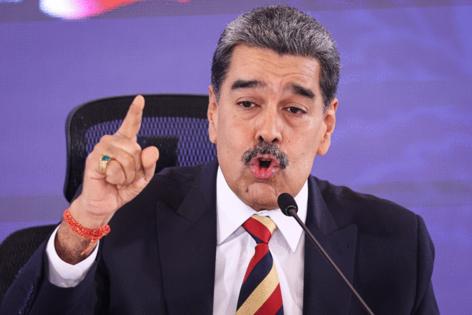Maduro says Rubio is trying to stain Trump's hands with blood
Published in News & Features
Venezuelan President Nicolás Maduro accused Donald Trump’s top diplomat of trying to push the U.S. leader into a massacre with the deployment of American forces near the South American nation.
Maduro, speaking to reporters in Caracas on Monday for the first time in over a year, blasted the White House’s decision to send 4,000 troops and warships to the Caribbean in what Washington calls a counter-narcotics mission. Singling out Secretary of State Marco Rubio, he said the move risks escalating into direct confrontation.
“Marco Rubio wants to stain his hands with blood, with South American, Caribbean, and Venezuelan blood,” Maduro said, addressing his response to Trump. “Even if they put 10,000 missiles on our heads, Venezuelans will be respected.”
The operation includes the Iwo Jima Amphibious Ready Group and the 22nd Marine Expeditionary Unit, which can strike land targets — a more aggressive posture than the Coast Guard cutters usually tasked with intercepting drug shipments. US officials say they’re targeting the Cartel de los Soles, a network they claim is run by Venezuelan officers with Maduro’s support.
Trump has labeled Maduro a “terrorist” and in August offered a $50 million reward for his capture. During his first term, the U.S. president imposed sweeping sanctions, recognized opposition leader Juan Guaidó as Venezuela’s interim leader, and pressed for Maduro’s ouster.
Maduro responded to the fresh U.S. threat with his own deployments, sending troops and vessels to Venezuela’s borders and key oil hubs. Still, he signaled a willingness to talk, saying he hoped to restore “broken” communication channels with U.S. officials, including chargé d’affaires John McNamara and Richard Grenell, who visited Caracas in January as Trump’s special envoy.
Venezuela’s government has also freed political prisoners and continued cooperating on deportations from the US. Maduro pledged to keep migrants flights going to Caracas, including the return of 70 children separated from their parents.
The U.S. buildup, the biggest in Latin America since the 1989 invasion of Panama, has divided the region. Brazil’s Luiz Inácio Lula da Silva and Colombia’s Gustavo Petro criticized it as destabilizing, while Guyana and Trinidad and Tobago endorsed the effort, citing drug trafficking concerns. China, Russia and Iran condemned the move as interference.
Analysts say the relatively small scale of the U.S. deployment suggests Trump isn’t preparing an invasion. Instead, the show of force may be intended to disrupt smuggling routes, deter Maduro from arresting opposition figures, and pressure Venezuela’s military to reconsider its loyalty.
Maduro called the U.S. move an “extravagant, unjustifiable, immoral threat,” which he described as Rubio’s attempt at regime change. “If Venezuela were attacked, it would immediately enter a period of armed struggle in defense of the national territory,” he said. “We would constitutionally declare the republic in arms.”
©2025 Bloomberg L.P. Visit bloomberg.com. Distributed by Tribune Content Agency, LLC.







Comments